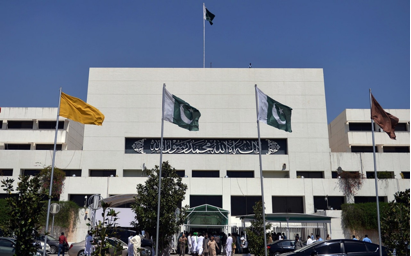ISLAMABAD: Pakistan on Thursday expressed serious concerns over the violations of human rights in Indian-occupied Kashmir and called for resolving the issue in the light of United Nations (UN) resolutions.
Speaking at a weekly press briefing, the Foreign Office spokesperson Tasneem Aslam said that Pakistan has differences with India regarding cases instituted against Kashmiri leaders and it will continue to support the people of Kashmir morally, politically and on diplomatic level. “We took up the Srinagar issue on appropriate forum, while human rights violations are continued in Indian-occupied Kashmir,” she added. “Indian torture of peaceful protesters is illegal.”
About rising of Pakistani flag in the streets of Srinagar she said it was the manifestation of the deep and lasting emotional bonds between the people of Indian-Occupied Kashmir and the people of Pakistan. Aslam said it was regrettable that India chose to use excessive force against peaceful demonstrators over exercising their right to peaceful assembly. Pakistan believed that the charges against the Kashmiri leadership were bogus and illegal as India could not have any legal right to demand allegiance to India by the people of Kashmir, who belong to a disputed territory and whose final settlement according to UN Security Council resolutions was yet to happen.
its editorial titled ‘Nuclear Fears in South Asia’. The editorial seems to be part of a familiar pattern of motivated and, at times ill informed, campaign which surfaces at regular intervals. The editorial analysis by the New York Times misses out entirely on the well-established facts about introduction of nuclear weapons in South Asia. Pakistan was not the first to introduce nuclear weapons in South Asia. Pakistan was forced to develop nuclear capability purely for self-defence.
She said Pakistan is a responsible nuclear weapons state with a robust command and control structure headed by the prime minister. Pakistan strictly conformed to the concept of credible minimum deterrence and could not want a conventional or nuclear arms race in South Asia. “We have been compelled to develop a full spectrum deterrence capability to maintain regional stability and to deter aggression,” she maintained. Pakistan’s bilateral proposal to India of a Strategic Restrain Regime (SRR) remains on the table since 1999 without a positive response. The SRR consists of three interlocking elements of nuclear and missile restraint, conventional balance and conflict resolution. It is important to view the situation in South Asia in a non-discriminatory and neutral manner and support Pakistan’s efforts for stability and lasting peace in the region.
